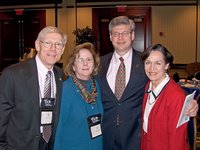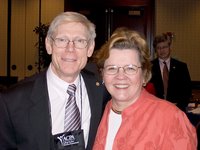I haven't posted on my blog for about a month - sorry for those who might be watching. Miami activities have kept me very busy and preoccupied. I have struggled to return to writing
Deeper Learning in Leadership but plan to begin again today. I had a couple of other writing projects that had to take precedence so I had little choice.
I recently attended the National Association of Student Personnel Administrators convention in D.C. I had a very interesting time attending sessions, greeting long-standing friends, and watching where student affairs is as a field. My roommate was Ron Slepitza, a fellow graduate school colleague who has been a life-long friend. I also caught up with Dave Doyle, a former Miami ASG President. One of the sessions I found most interesting was one on "Discovering a Calling: How Colleges Enable Students to Discover Meaning and Purpose." I went to this session partially to see if they were aware of either Sharon Daloz Parks' or Senge et al's work. Parker Palmer was referenced but not the others. In some ways I was surprised but in other ways I was not. Hopefully,
Deeper Learning in Leadership will help bring these other names into common awareness. The point of the session was that college students are more interested in spiritual journey and the discovery of purpose these days. No one seems to be able to determine why but perhaps that doesn't matter. The shift to greater interest in finding purpose is something that educators should embrace but exactly how we do this is the question.
One of the ideas that Frank Shushok from Baylor mentioned was that their programs foster "holy discontent." Actually, I don't know if the spelling should be "holy" or "wholly." Either would work. What he was saying is that, in order for students to discover things that really matter to them, they need to become discontent with something in the world - discontent enough that they will give theit best talent, time and energy to resolve it. This concept is very similar to Senge et al's "presencing" process and it is also related to Parks' admonition to nurture big questions and worthy dreams (check former blog posts on these topics). I don't know if Baylor's "wholly" was one based on the notion of "entire" or "complete" dissatisfaction or if it was "holy," meaning that there is something that is deeply spiritually compelling about it. Perhaps Baylor is attempting to foster both and they would both likely be relevant.
This idea left me wondering about my own holy/wholly discontent - what is it and how far will it take me? It also left me wondering how I might stimulate this level of discontent in others. Further, what can I do to respond to others' discontent? Sometimes discontent is a very powerful thing and not easy to deal with. I know what it feels like to have students, staff, and others who are dissatisfied with something. Particularly when it's something about which I'm not particularly annoyed, it's an inconvenience to encounter their passion. However, I know how important my discontent is and I seek to keep that alive in me - therefore, I should seek to keep it alive in others. I'm not sure I can answer my own question today but at least it's hear to ponder...


